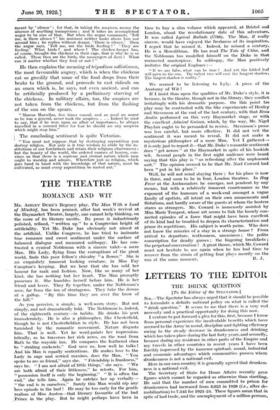THE THEATRE
ROMANCE AND WIT
MR. ASHLEY DUKE'S Regency play, The Man With a Load of Mischief, has been praised, after last week's revival at the Haymarket Theatre, largely, one cannot help thinking, on the score of its literary merits. Its prose is industriously polished, refined, " written up " to a Congrevian height of artificiality. Yet Mr. Duke has obviously not aimed at the artificial. Unlike Congreve, he has tried to insinuate true romance and sweet sentiment under the surface of balanced dialogue and measured soliloquy. He has con- trasted a cynical Nobleman with a sincere valet—a mere Man. His Lady, flying from the corruptions of the great world, finds this poor fellow's chivalry " a flower." She is an exquisitely innocent looking creature, in Miss Fay Compton's keeping. But we hear that she has sold her honour for rank and fashion. Now, like so many of her kind, she has nothing but her heart. The Man promptly possesses it. She humbles herself before him. He is her friend and lover. They fly together, under the Nobleman's nose, far from the inn of stratagems. They take the downs at a gallop. " By this time they are over the brow of the hill."
As you perceive, a simple, a well-worn story. But not simply, and not dramatically told. The Nobleman is, indeed, of the eighteenth century—in habits. He drinks his port immoderately. He is also a philosopher, like Chesterfield, though he is not Chesterfieldian in style. He has not been tarnished by the romantic movement. Nature disgusts him. That is well. Yet he word-paints her impression. istically, as he traverses her rich acres, on the road from Bath to the wayside inn. He compares the feathered elms to " striding cockerels." God save us, how well he talks ! And his Man is equally sententious. He makes love to the Lady in sage and serried maxims, does the Man. " You .spoke to me as friend," says she. "Friendship is frankness," says he. " I am not afraid of little things," she says. " We are both afraid of their littleness," he retorts. For him, " possession itself is only the beginning." " It is often the end," she tells him. Again he catches her up verbally- ." the end is in ourselves." Surely this Man would nip any love episode in the bud ! He may be too early for the gentle realism of Miss Austen—that literary favourite of the bad :Prince in the play. But he might perhaps have been in time to buy a slim volume which appeared, at Bristol and London, about the revolutionary date of this adventure. It was called Lyrical Ballads. (1798). The Man, if really sincere, would have enjoyed the freshness of its inspiration. I regret that he missed it. Indeed, he missed a century. He is a Meredithian. He has read The Talc of Chloe, and the Nobleman has modelled himself on the Duke in that mannered masterpiece. In soliloquy, the Man positively imitates the original Euphues :— " If we are false, what can be true ? And yet the folded leaf will open to the sun. The tallest tree will cast the longest shadow.
The longest shadow is reality."
We seemed to be listening to Lyly. A piece of the Anatomy of Wit !
If I insist thus upon the qualities of Mr. Duke's style, it is because, in the theatre, though not in the library, they conflict irritatingly with his dramatic purpose. On this point his play may be contrasted with the like experiments of Henley and Stevenson at the end of the last century, with that Beau Austin performed on this very Haymarket stage, or with the excellent Admiral Guinea, which, by the way, Mr. Nigel Playfair ought to be persuaded to revive. Stevenson's prose was less careful, but more effective. It did not veil the sentiment it was meant to reveal. It did not make a mysterious philosopher of a mere Man. Yet I gathered— it is only just to report it—that Mr. Duke's romantic sentiment does " get across " at the Haymarket in spite of his bookish wit. Several people in the first night audience were heard saying that this play is " so refreshing after the unpleasant sort." The opinion seemed to be that Mr. Noel Coward had been " put in his place."
Well, he will not mind staying there ; for his place is now in three, and soon to be in four, London theatres. In hay Fever at the Ambassadors he emerges, not penitent by any means, but with a relatively innocent countenance as the exponent of the humours of a week-end amongst a vague family of egotists, all intent on their own amusements and flirtations, and hardly aware of the guests at whom the hostess stares as strangers. Mr. Coward is immensely assisted by Miss Marie Tempest, whose art seems to link the loosely con- nected episodes of a farce that might have been excellent of its kind had he troubled to deepen its characterization and prune its repetitions. His subject is worth pains. Who does not know the miseries of a stay in a strange house 7 From arrival to departure, restlessness, uneasiness ; the polite conscription for deadly games ; the lingering breakfasts ; the perpetual conversation ! A great theme, which Mr. Coward must not hesitate to use again when he has had time to recover from the strain of getting four plays merrily on the










































 Previous page
Previous page